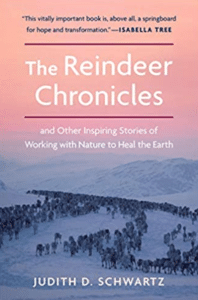Let’s Read The Reindeer Chronicles
Someone in my orbit tweeted this past week (on January 7, to be precise) that they were disappointed after their free 7-day trial and wished to return 2021 to the seller. I wish I could remember who it was.
For all our hopes and dreams about leaving a painful 2020 behind, here we are, haunted in our collective future by years, decades and centuries past. Even, as we speak, facing a probable new set of crises unknown to me as I wrote this over the weekend.
But before I invoke a slate of dramatic turns of phrase, let’s talk about the language we use to describe our (as of this moment) unprecedented state of affairs. Ezra Markowitz and Lucia Graves wrote in the Washington Post shortly before the ball dropped on 2020 that the way we talk about catastrophe can thwart the very progress we earnestly seek.
How We Talk About Catastrophe
“Narratives of catastrophe and crisis can create nasty feedback loops that make it harder to achieve the compromise, hard work and sustained engagement necessary for meaningful action, especially in a deeply divided society,” Markowitz and Graves write, citing a variety of studies over three decades that demonstrate “exposure to information about the massive scale of crises can lead people to all sorts of counterproductive responses, variously engendering indifference toward others’ suffering, false feelings of inefficacy, or a turn inward toward self-preservation.”
Of course, they would not suggest that the better response is not to talk about crisis at all. And in fact, they say, when there is an acute situation where urgent action is required and a solution is possible within a defined period of time (such as a pandemic or natural disaster), such urgent language is more productive. But when long term, sustained action is needed, we need another way of speaking. They suggest four potential ways forward in our thinking and communicating.
First, we can start with a shift away from solely focusing on the catastrophe and starting to paint a picture of the future we could have. “There’s a reason one of the most galvanizing orations of all time is the Rev. Martin Luther King Jr.’s ‘I Have a Dream’ speech; ‘I Have a Nightmare’ probably wouldn’t have been nearly as powerful, even if it would have more accurately portrayed the terrible truth of the moment America was living through,” they write. Next, we can shift from exclusively using strong negative emotions (fear, despair, guilt) and considering the potentially motivating power of emotions like “awe, pride and anger.” Markowitz and Graves reflect on the importance of context—that is, “stories that lay out not only what is happening but also how and why those things are unfolding”—in helping people engage rather than disconnect. And finally, we can tell stories that help people believe a different future is possible, noting that “solutions-oriented narratives and imagery offer a positive vision that can promote greater issue engagement, efficacy and large-scale public action.”
The Positive Power of Inspiring Stories
Judith D. Schwartz is one such communicator who knows the power of these stories. And The Reindeer Chronicles: and Other Inspiring Stories of Working with Nature to Heal the Earth is one such book that does not candy-coat the potential disaster we face across the globe in the shadow of climate change, but that puts forward stories of possibility that leave the reader with options beyond “fear, despair and guilt.” The publisher notes that “Schwartz explores regenerative solutions across a range of landscapes: deserts, grasslands, tropics, tundra, Mediterranean. She also highlights various human landscapes, the legacy of colonialism and industrial agriculture, and the endurance of indigenous knowledge. The Reindeer Chronicles demonstrates how solutions to seemingly intractable problems can come from the unlikeliest of places, and how the restoration of local water, carbon, nutrient, and energy cycles can play a dramatic role in stabilizing the global climate. Ultimately, it reveals how much is in our hands if we can find a way to work together and follow nature’s lead.”
Become a Patron to Join This Club

February 3: Ch. 1-3
February 10: Ch. 4-5
February 17: Ch. 6-7
Buy The Reindeer Chronicles by Judith D. Schwartz
___________________
Photo by the Real Kam75, Creative Commons license via Flickr. Post by Will Willingham.
- Earth Song Poem Featured on The Slowdown!—Birds in Home Depot - February 7, 2023
- The Rapping in the Attic—Happy Holidays Fun Video! - December 21, 2022
- Video: Earth Song: A Nature Poems Experience—Enchanting! - December 6, 2022

L.L. Barkat says
Such a fabulous book. The chapter on China alone is worth the foray.
I continue to be amazed at how much the Earth can come back, given some unexpected nudges.
Will Willingham says
I’m really looking forward to it. 🙂
I think knowing that the earth can heal can be so helpful. It’s easy to get stuck with ideas of “it’s too much, it’s too late.”
Bethany R. says
“… we can tell stories that help people believe a different future is possible, noting that ‘solutions-oriented narratives and imagery offer a positive vision that can promote greater issue engagement, efficacy and large-scale public action.’”
“solutions to seemingly intractable problems can come from the unlikeliest of places …” —I love the hope and fun in that. Will be interesting to explore and see what is already available and possible.
I’m thinking also about the application and possibilities of this idea for a variety of projects.
Will Willingham says
Such a great observation, Bethany. This way of thinking can be useful in how we face so many things. 🙂